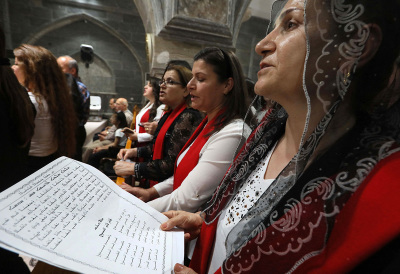
If I returned to my homeland today, more than 40 years after I left as a refugee, I would be arrested and subject to execution or life imprisonment. That’s the kind of persecution Christians face in Iraq, and what life is like for them in Muslim-majority countries around the world.
After fleeing Saddam Hussein’s Iraq in 1982, I never imagined facing new threats from my native land. But two documents from the Shia-led Iraqi government have falsely labeled me as a “Zionist entity” and declared me wanted for exposing Shia militia activity in Europe.
These edicts endanger not only me personally, but also my ministry to refugees from the Middle East. My missionary work doesn’t take me to Iraq, but I do travel to nearby countries where Iraq could try to extradite me or European countries where Shia militia poses a threat.
For most Americans, it’s hard to imagine a situation like this or the persecution that Christians face in Muslim-majority countries like Iraq. Picture yourself in their situation for a moment. Perhaps you’ve had your home — along with everything you own — burned to the ground by militant extremists. Maybe you’ve even seen your family members executed before your eyes. And you’re told, “Leave, or we’ll do the same to you.”
It is nothing out of the ordinary for Christians in the Middle East to be treated as less than human because, after all, Muslims consider them infidels. Christians aren’t eligible for the highest public offices and don’t have a major say in anything else.
But the persecution goes much deeper in society than a nation’s laws. Most persecution against Christians happens in homes, classrooms, and workplaces where they are denied opportunities and basic rights afforded to the religious majority.
When I was growing up, my family had to have the official picture of President Hussein in our home in case a government official visited, and anyone who spoke against the government faced arrest. One student disappeared from my school, and I found out a year later that he had been executed because he had spoken out against Saddam.
Undercover government agents visited the Catholic church I attended to ensure that no anti-Saddam political activity was occurring. They were easy to spot because no one knew them, and they asked a lot of questions.
One day, my father forgot he could not smoke a cigarette during Ramadan, and he ended up in jail for two days. Looking back, he got off easy.
Saddam’s regime fell in 2003, but ISIS began a campaign of genocide in 2014 against Christians and other religious and ethnic minorities in Iraq. The United States Commission on International Religious Freedom condemned the “mass executions, mass rapes and sexual enslavement, abductions, forced conversions to Islam, forced conscriptions into ISIS’s forces, and other atrocities” that took place before the defeat of ISIS in 2019.
Today, the persecution continues at the hands of men who claim to be Christians but secretly pledge loyalty to extremist groups like the Iranian Revolutionary Guard, Hezbollah, and the Houthis. One such figure, a warlord named Rayan al-Kildani, pretends to represent Iraqi Christians while persecuting true believers, and the Muslim majority allows it. He has been sanctioned by the U.S. for human-rights abuses and exploited legal loopholes to usurp Christian political representation in the Nineveh Plains, home to most Iraqi Christians.
These conditions in Iraq have led to a mass exodus of Christians, with the population dropping from 1.5 million in 2003 to an estimated 150,000 today.
And at a time when so many are fleeing, I can’t go home.
Dr. Jalil Dawood, who came to America from Iraq and is now a US citizen, is the founder of World Refugee Care and the pastor of the Arabic Church of Dallas.















